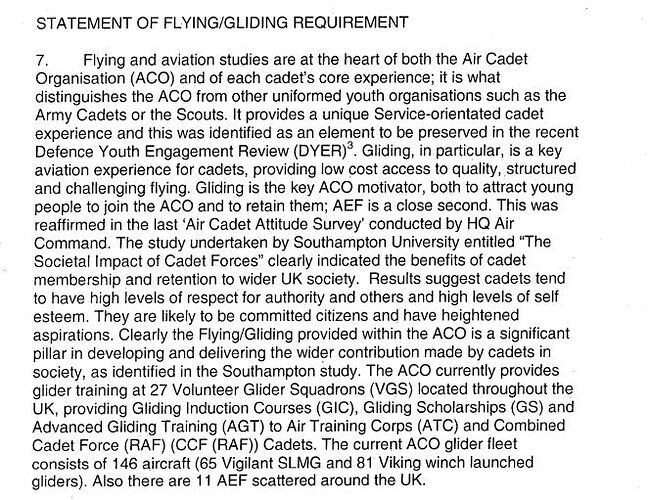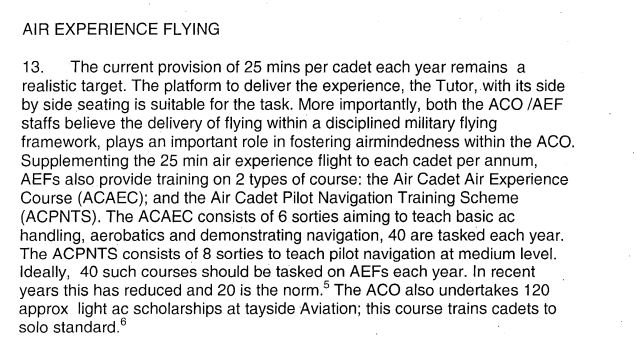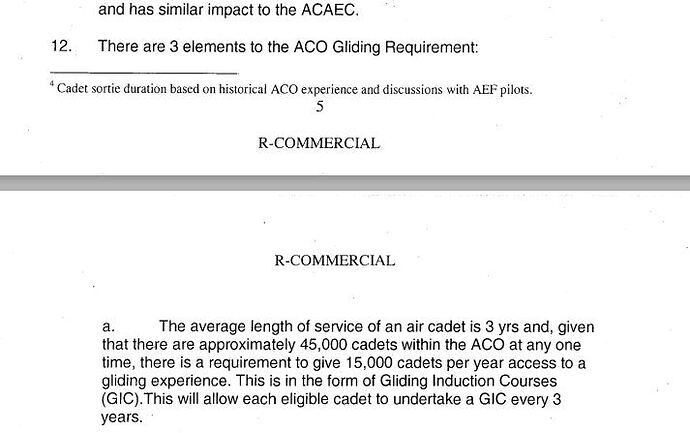I’ve held off commenting on this - mostly because I’ve not had access to a laptop for a few days and didn’t fancy typing this on a keyboard the size of a Lego brick! There have been some amazing and hugely insightful comments here which largely mirror my own , so I’m not going to repeat them. But i will try and put a slightly different spin on things.
Is RAFAC in a death spiral? No; we are doomed to succeed for as long as the RAF have a vested interest in us.
The RAF as a whole won’t let RAFAC fail. They’ll tweak it and change it and adjust it and meddle with it - but they won’t let it fail because it forms part of the Youth Engagement agenda - they see a return on investment. And because, we’re one of the “RAF family” - albeit, sometimes feelings like a very distant relation who’s parents determine our direction of travel without actually responding to our own needs.
Furthermore, the RAF won’t let RAFAC fall on it’s backside whilst the ACF and SCC continue -the loss of face in Whitehall would be too much. The others cadet forces are, by all accounts, experiencing some similar flux as well. They too have lost experienced CFAVs at the coalface - but they’ve lost them because of covid in isolation, rather than covid PLUS the issues we’re currently experiencing.
BUT.
I do think we’re at a point where there are a swathe of CFAVs questioning their relationship with RAFAC. I don’t believe it will be a critical mass of CFAVs leaving that many think; but any staff member leaving will be impactful - it might only be to their Squadron, or their Wing, but it will undoubtedly have wider impacts. One of impacts maybe to sew seeds of doubt in those who remain.
Given the passion, commitment, investment and sacrifices people have made in pursuit of their hobby, leaving is always going to be difficult and an emotive issue. To dismiss these feelings and emotions as “it’s time for you to go”, or, as I’ve heard recently “you volunteered for this - you can unvolunteer at any time” - is crass, insensitive and devalues everything they have given to the organisation. It is also the final validation some people need to cement their decision - and they leave with bitterness and resentment.
However, those comments - and this whole subject has - has reminded me of a poem I first heard on ACC around 20 years ago - probably from Oz or Incubus (RIP). Maybe from MikeWhiskey or 10tacphantom. It isn’t pleasant reading; but it does go someway to explaining why CFAV leaving isn’t necessarily the death spiral some feel it is…
There Is No Indispensable Man - Saxon White Kessinger
Sometime when you’re feeling important;
Sometime when your ego’s in bloom
Sometime when you take it for granted
You’re the best qualified in the room,
Sometime when you feel that your going
Would leave an unfillable hole,
Just follow these simple instructions
And see how they humble your soul;
Take a bucket and fill it with water,
Put your hand in it up to the wrist,
Pull it out and the hole that’s remaining
Is a measure of how you will be missed.
You can splash all you wish when you enter,
You may stir up the water galore,
But stop and you’ll find that in no time
It looks quite the same as before.
The moral of this quaint example
Is do just the best that you can,
Be proud of yourself but remember,
There’s no indispensable man.
This poem is sad and humbling. The CFAV will read this poem differently to HQAC - but it’s a sad truth that RAFAC will endure; irrespective of the passionate CFAV leaving their squadron.
The poem does remind me of the attitudes I’ve seen in some of our “leaders” - mostly those with a different mindset from the Armed Forces or Civil Service backgrounds. Paid staff will always have a very different outlook from those making a conscious decision to volunteer. The CFAV brings a different outlook and perspective; they will have different values and prioritize things differently - and it’s these things which, i fear, are being overlooked at the moment.
Very few of us volunteer to sit in an office doing 3 hours of administration to make a 90mins climbing session happen. Or gather evidence of assurance so as to take cadets to a museum for half a day. Or to drive our SOVs to a garage during a working day for a new assurance check. Or to put in an extra days bag packing every year (and associated paperwork!) just to fundraise enough money to put the SOV through those extra checks.
A Squadron dropping from 5 CFAVs to 4 CFAVs immediately increases the workload (and pressure) on those that remain. Then consider the the skills, knowledge and experiences that have gone with them - perhaps they were a Shootists type, the only RCO or WI. Perhaps they were the only BEL and delivered DofE on Squadron. Maybe they were the one who always used to do Flying/Gliding allocations. Or the only one who really got AirNav. Were they the staff member who you could guarantee that would be there through the Winter just as a body so the squadron could open its doors? Or the one who couldn’t teach effectively, but could Adj the hell out of the squadron and were there when the Contractors came knocking?
Whenever a CFAV leaves the Squadron - and takes their skills with them - the squadron as a whole will make adjustments and survive. Maybe they just don’t do the stuff they did anymore. Maybe another CFAV will step up and fill the breach instead. Maybe the Sector commander will help and support instead. But the hole left will - in time - be filled. New CFAV bring in fresh insights without the baggaging and burdens that I - and others carry. The new cadets that come through the door post-covid will know no different - they will accept the organisation as it stands now.
In organisational development theory, Tuckman would suggested that Squadrons after a change in CFAV or even post-covid - will be moving back a few steps - perhaps to Forming or Storming or Norming but they will, with time move forwards to Performing again. The downside is of this cycle is that is tiring and time consuming for those that are left - and the cycle takes its toll on squadrons, CFAVs and leaders.
One of my personal frustrations is that we as a collective identified many years ago this organisation has a retention issue - and until these are addressed, any recruitment simply keeps squadrons on tick over. It doesn’t allow for effective staff development as everybody is fighting to catchup all the time. How many young officers or new comers to the organisation are thrust into Command without full appreciation of what they are getting into, burn out and leave? How many Squadron commanders are effectively supported at the moment? How many Squadron Commanders are able to effectively mentor their new staff? And are adding more safety administrative burdens to the mix helping to do this? Until we address retention effectively, we will keep on tick over.
As a CFAV I take absolute pride in delivering activities to cadets. Whilst my hand remains in that RAFAC shaped bucket, I will strive for excellence in that delivery. My reward is that little a buzz of a “thank you”. Or seeing a shy cadet lead a team in a drill competition 3 years later. I thrive in providing young people these incredible experiences.
But I’m also a realist - and a cynic with it - I’ve been to enough Squadron reunions to know that I won’t be here forever. I’m a temporary custodian - and my time will pass. I have had the privilege of having met our forefathers - “the old guard”; cadets from the 1940s and 1950s. If I leave today, next week, a few months or a few years time, I just hope that the cadets I teach today will reflect on me in the same way the old guard hold their CFAVs - with such reverence, esteem and value. If they don’t, so be it, i tried my hardest to make a difference and to live up to the values of the organisation whilst I was here.
I think that RAFAC will endure and survive irrespective of many CFAV at this juncture. Thinking back to the Indispensable man, I’d prefer that those CFAVs who do chose to leave do so on good terms; that the water left in that bucket carries a legacy where we can reflect on and celebrate their achievements. The hole will be filled - but what’s left is a little bit better than before.
My fear is that the bucket is currently being tainted by bitterness and resentment, brought about by poor leadership, flawed decision making and mismanagement of the volunteer. People are leaving, and the holes are being filled, but what remains isn’t as healthy as it should be. Until that’s addressed, we’ll continue to have these issues.












